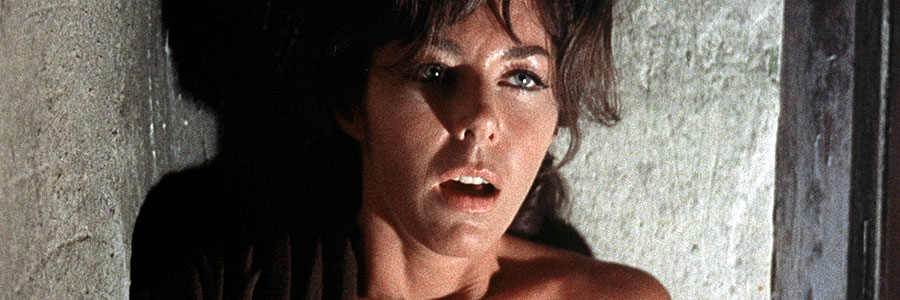
Sergio Leone & Women
There’s very little way to put a gloss on this so let’s get it over with straightaway: Sergio Leone’s films are misogynistic in their representation of women. Women are beaten, raped, or pressured into having sex in the vilest way in every film. They’re manipulated by the men, often have few if any lines, and although they’ll sometimes be saved or protected, they actually have very little say in the matter.
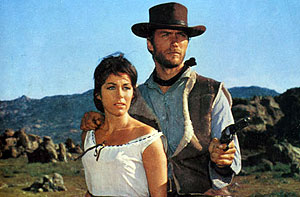 Fistful Of Dollars, dir. Sergio Leone, 1964
Fistful Of Dollars, dir. Sergio Leone, 1964In Fistful Of Dollars (1964), Marisol (Marianne Koch) is taken by Ramòn (Gian Marià Volante) to pay her husband’s gambling debts: ‘It is an old story’, the innkeeper tells Joe (Clint Eastwood). She’s separated from her nominally holy family – she’s Mary, her son is Jesus – and kept to serve Ramòn’s whim. To add to her strife, a comic moment will come when Joe punches her in the face by accident and then uses her as a counter in the complex game he’s playing to profit from the warring of the Baxters and the Rojos. Joe will ultimately save her and her family, in his one unambiguously good act: ‘Because I knew someone like you once. There was no one there to help.’ However, the stern matriarch of the Baxters played by Margarita Lozano – and who Joe has already surprised earlier in the film in her boudoir will be shot to death on the porch of her burning houses, having already watched the massacre of her family.
Already we can see two separate strands to Leone’s view of women: one is that women are out of place in the West. Marisol’s punched in the face by literally getting in the way. Donna Baxter’s killed like a man because she behaves like a man, having called the shots more effectively than her inept husband. But there’s also the sense that women provide the motivation for the good character which is expressly rooted in his own otherwise hidden biography. This is also true in For a Few Dollars More (1965) with the most noble and moral character of the film, Colonel Douglas Mortimer, entirely motivated by the rape and suicide of his sister, played by Rosemary Dexter, which is revealed in a series of drug hazed flashback that the rapist El Indio (again Volante) relives. The defending of Marisol and the revenge of Mortimer’s sister, however, can’t go far as a counterclaim to the misogyny the film’s otherwise display. Rather they’re a continuation and indeed validation of that misogyny. Both women have either no or very few lines. They’re sorrowfully accepting of their fate or they destroy themselves. They become passive empty spaces to be filled by the men as justification for their further acts of violence.
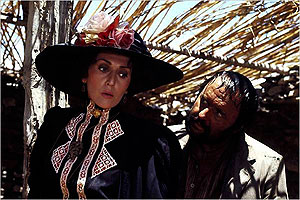 The Good, The Bad And The Ugly, dir. Sergio Leone, 1966
The Good, The Bad And The Ugly, dir. Sergio Leone, 1966The Good, The Bad And The Ugly (1966) will largely succeed in keeping women out of it but for the unfortunate girl of Bill Carson. Having apparently been abused by a bunch of drunken soldiers and abandoned, she’s then given a savage beating Angel Eyes, played by Lee Van Cleef. The beating is extended in the restored DVD/blu-ray version of the film. Tuco (Eli Wallach) also has a long list of crimes including rape, and apparently child abuse.
The manscape of The Good, The Bad And The Ugly gave way in 1968 to Leone’s first major female character in Once Upon A Time In The West. In a career defining role Claudia Cardinale plays Jill, a prostitute starting a new life in the West, but her attempt a fresh start is shattered when she arrives to find her new family murdered and herself in the middle of a turf war provoked by the arrival of the railway. Cardinale gives Jill a tough minded strength. She’s inured to rape. She’ll just have a hot bath and all that will be left is one more bad memory. She uses sex in an attempt to save herself from the hired killer Frank, an unrecognisable Henry Fonda. And yet for all Cardinale should be praised for finally giving us a woman of substance, this is no feminist role model. Aside from the bland acceptance of rape, Jill spends the film seeking the protection of a man. Will it be Cheyenne, Harmonica or Frank? And her last role is that of camp matriarch providing the railroad workers with food and drink and the sight of a pretty woman. And if they should slap her behind, then make nothing of it, Cheyenne tells her: ‘They’ve deserved it.’ In other words accept your place as a woman and be thankful you’re not getting raped much.
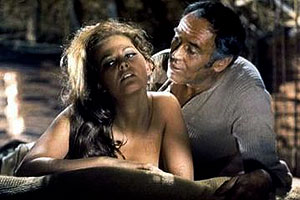 Fistful Of Dynamite, dir. Sergio Leone, 1971
Fistful Of Dynamite, dir. Sergio Leone, 1971Fistful Of Dynamite, also known as Duck You Sucker! (1971), presents a new aspect to the question of misogyny. Up until now there’s been plenty of brutality towards women but it’s been largely perpetrated by the wicked, or (in Tuco’s case) the ugly. Here, in the opening scene, a stagecoach of obnoxious rich people is held up by the bandit, Juan Miranda, played with gusto by Rod Steiger. Miranda takes the lady away from the others and pulls his cock out; when she feints he gives the presumably comic line, ‘You’re going to miss the best part.’ This recalls a forgotten and unsavoury strand to the political radicalism of the 60s and 70s when the suggestion was made by Black Panther Elridge Cleaver that rape could be an insurrectionary act. Miranda is exacting revenge that the film seemingly approves of.
Leone’s final film Once Upon a Time in America (1985) is so open in its misogyny to almost be about misogyny. Robert de Niro plays Noodles, an old man who returns to his neighbourhood to relive his career as a gangster and understand the circumstances surrounding a final betrayal. In the midst of this there’s also the story of a love affair that lasted a lifetime between himself and his childhood sweetheart, Debora. Resentful of her aspirations to a better life far from their neighbourhood, even as a child Noodle’s adoration is mixed with bitter feelings of hatred: ‘She’s going to get what’s coming to her.’
Women are linked throughout with prostitution and violence. A woman is gunned down in the first five minutes of the film. When Noodles emerges from prison he’s greeted by his friend Max who’s driving a hearse. They admire the naked corpse of a young girl, who then springs to life in an elaborate joke. During a bank robbery, Noodles rapes one of the tellers (Tuesday Weld). This is mitigated by the fact we know the woman is in on the job and the sense that she’s provoking Noodles and in reality wants to be raped. This is later confirmed when the woman shows up again in a whorehouse and the rape is referred to via another practical joke. The gang cover their faces with their handkerchiefs and pull out their penises which Carol inspects in order to identify her previous acquaintance.
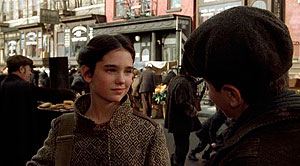 Once Upon a Time in America, dir. Sergio Leone, 1985
Once Upon a Time in America, dir. Sergio Leone, 1985The plethora of misogynistic mythmaking and justification in this whole subplot is almost incredible, but in fact Carol’s story is really a preparation for the dénouement with Debora (Elizabeth McGovern). Having tried to woo her in a swanky restaurant hired solely for the purpose (and actually shot on the Lido in Italy), Noodles disappointed and angry at what he perceives to be her rejection of him rapes her in the limousine as they drive home. The rape is protracted and savage, and stands alone as a moment when we’re watching the end product of a life of frustration, wrongheadedness and violence. Noodles is destroying his one justification and chance for a better life. He’s abhorrent and yet weirdly, he’s the victim. Rape is here more an act of self-destruction which is further mitigated by the earlier rape. What Noodles fails to understand (according to the film) is that there are some women you can rape (Carol) and some who you can’t (Debora). The second rape is horrible in which we have sympathy for the victim and feel repelled by Noodles. The first rape takes place I the charged excitement of a robbery and is capped with a ‘I’m coming’ joke.
So can we give Leone any leeway or any explanation without falling back on some patronising guff about Mediterranean attitudes to women, the whore/Madonna mentality etc.? I would argue (as much as I admire Leone the filmmaker) no. Of course, the time was not a good one for female roles. Italian cinema from the Gialli of Dario Argento to the super cop movies recently documented in Eurocrime were rife with rape and vicious brutality directed against women. In Hollywood, Sam Peckinpah likewise seemed to find violence towards women thrilling and Eastwood (a WASP if there ever was one) was also happy to replicate similar attitudes in – among others – High Plains Drifter (1973). However, these men made their own movies and their own times as well as being products of it. And there were directors who managed to deal with rape without glamorising or justifying it: Ingmar Bergman’s The Virgin Spring for instance.
Leone’s cinema has many things going for it which I will detail elsewhere, but when it comes to misogyny we can only express regret when it isn’t outright disgust.
————————————————————————–
Note: The extended version of Once Upon A Time In America is currently showing in Italy and is due for a Blu-ray release this December. With over 20 added minutes it’s possible that the trend of the film is to some extent softened or explained. If this turns out to be the case I will publish an addendum.
—–
Part 1: The Game of Death
Part 2: Sergio Leone & Women
Part 3: The Man with No Name

John Bleasdale
John Bleasdale is a writer based in Italy. He has published on films at various internet sites and his writing can be found, along with blog posts, collected at johnbleasdale.com.
He has also contributed chapters to the American Hollywood and American Independent volumes of the World Directory of Cinema: (Intellect), Terrence Malick: Films and Philosophy (Continuum) and World Film Locations: Venice (Intellect). You can also follow him on Twitter @drjonty.
© 2022 STATIC MASS EMPORIUM . All Rights Reserved. Powered by METATEMPUS | creative.timeless.personal. | DISCLAIMER, TERMS & CONDITIONS
HOME | ABOUT | CONTACT | TWITTER | GOOGLE+ | FACEBOOK | TUMBLR | YOUTUBE | RSS FEED
CINEMA REVIEWS | BLU-RAY & DVD | THE EMPORIUM | DOCUMENTARIES | WORLD CINEMA | CULT MOVIES | INDIAN CINEMA | EARLY CINEMA
MOVIE CLASSICS | DECONSTRUCTING CINEMA | SOUNDTRACKS | INTERVIEWS | THE DIRECTOR’S CHAIR | JAPANESE CINEMA





